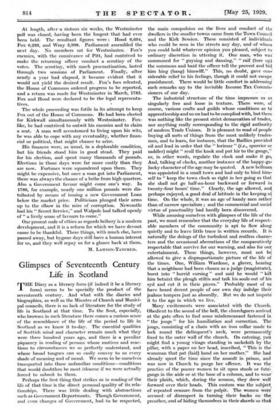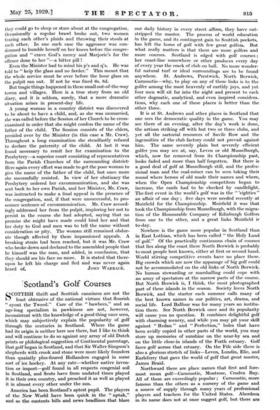Glimpses of Seventeenth Century Life in Scotland
THE Diary as a literary form (if indeed it be a literary form) seems to be specially the product of the seventeenth century. And what with the diaries and biographies, as well as the Minutes of Church and Munici- pal councils, there is no lack of literature for the study of life in Scotland at that time. To the Scot, especially, who browses in such literature there comes a curious sense of the resemblance of the life of the period to life in Scotland as we know it to-day. The essential qualities of Scottish mind and character remain much what they were three hundred years ago, and there is a peculiar piquancy in reading of persons whose motives and reac- tions to circumstances we so perfectly understand, and whose broad tongues can so easily convey to us every shade of -meaning and of mood.- We seem to be ourselves transported into those unfamiliar conditions—conditions that would doubtless be most irksome if we were actually forced to submit to them.
Perhaps the first thing that strikes us in readingof the life of that time is the direct personal quality of its rela- tionships. There was little dealing with abstractions such as Government Departments. Though Government, and even- changes of Government,- had_ _to be respected, the main compulsion on the lives and conduct of the dwellers in the smaller towns came from the Town Council and the Kirk Session. These consisted of individuals who could be- seen in the streets any day, and- of -whom you could hold whatever opinion you pleased, subject to ordinary discretion in uttering it. One man, - who was summoned for " guysing and dansing,"• " raif (tore up) the summons and baid the officer tell the provest and bidt him hing (hang) himself." This, no doubt, gave con siderable relief to his feelings, though it could not-escape punishment. There would be little comfort in addressingf such- remarks say to the invisible Income Tax Commis.. sioners of our day.
The industrial structure of the time impresses us as singularly free and loose in texture. There were, a course, various crafts and guilds whose conditions as to apprenticeship and so on had to be complied with, but there was nothing like the present strict demarcation of trades, nor anything really corresponding to the rigid authority of modern Trade Unions. It is pleasant to read of people buying all sorts of things from the most unlikely trades.. men, and to learn, for instance, that the Baillies provided oil and lead in order that the " lorimar " - (i.e., spurrier or saddler) might " reull the knok and put hir to the gange," or, in other words, regulate the clock and make it go, And, talking of clocks, another instance of the happy-go-4 lucky character of the age may be quoted. A new bellmark was appointed in a- small town and had only to bind him- self to " keep the town clock so right in her going as that she shall not go half-an-hour backward or forward in twenty-four hours' time." Clearly, the age allowed, and perhaps enjoyed, a good deal of latitude in the keeping of time. On the whole, it was an age of handy men rather than of narrow specialism ; and the commercial and social virtue of punctuality had hardly been discovered.
While amusing ourselves with glimpses of the life of the past, we must remember that the everyday life of respect-. able members of the community is apt to flow along quietly and to leave little trace in written records. It is naturally the doings of the turbulent and restless charae-7 ters and the occasional aberrations of the comparatively respectable that survive for our warning, and also for our entertainment. These things, however, must not 1)4 allowed to give a disproportionate picture of the life of the times. One, William Wardone, a glover, hearing that a neighhour had been chosen as a judge (magistrate), burst into " horrid cursing " and said he would " kill him betuixt the pleugh stiltis and taik his soule out of his syd and cut it in tluie pieces." Probably most of us have heard decent people of our own day indulge their jealous tempers just as absurdly. But we do not impute it to the age in which we live. - Many excitements were associated with the Church; Obedient to the sound of the bell, the churchgoers arrived at the gate often to find some misdemeanant fastened in " the jougs " for his humiliation and correction. The jougs, 'consisting of a chain with an iron collar made to lock round the delinquent's neck, 'were permanently fixed to the outer wall of the church. On entering, you might find a young virago standing in sackcloth by the, pillar, with a paper on her head, inscribed, " This is the wumman that pat (laid) hand on her mother." She had already spent the time since the assault in prison, and was now in Church to purge her offence. It was the practice of the poorer women to sit upon stools or fute:.: gangs in the aisle or at the base of a column, and to wear' their plaids, which, during the sermon, they drew well forward over their heads. This custom was the"subject of repeated censure- from- the pulpit: The women were accused • of disrespect in turning their backs on the preacher,-and-42of- hiding themselves in their shawls so that
•
they could go to sleep or stare about at the congregation. Occasionally a regular brawl broke out, two women tearing each other's plaids and throwing their stools at each other. In one such case the aggressor was con- demned to humble herself on her knees before the congre- gation and " crave God's mercy and Marjorie's for the offence done to her "—a bitter pill !
Even the Minister had to mind his p's and q's. He was told to " keip the glass and no farder." This meant that the whole service must be over before the hour glass on the pulpit ran out. If not he was fined 6s. 8d.
But tragic things happened in these small out-of-the-way towns and villages. Here is a true story from an old diary, and it is seldom, surely, that a more dramatic situation arises in present-day life.
A young woman in a country district was discovered to be about to have a child, and, as she was unmarried, she was called :before the Session of her Church to be cross- examined in order that she might confess the name of the father of the child. The Session consists of the elders, presided over by the Minister (in this case a Mr. Craw). Throughout a long examination she steadfastly refused to declare the paternity of the child. At last it was found necessary to remit her for examination to the Presbytery—a superior court consisting of representatives from the Parish Churches of the surrounding district- Here again every effort was made to get the poor woman to give the name of the father of the child, but once more she successfully resisted. In view of her obstinacy the Presbytery ordered her excommunication, and she was sent back to her own Parish, and her Minister, Mr. Craw, was instructed to make a final appeal in the presence of the congregation, and, if that were unsuccessful, to pro- nounce sentence of excommunication. Mr. Craw accord- ingly addressed her from the pulpit, imploring her not to persist in the course she had adopted, saying that no promise she might have made could bind her and that her duty to God and men was to tell the name without consideration or pity. The woman still remained obdur- ate though affected by these impassioned appeals. A breaking strain had been reached, but it was Mr. Craw who broke down and declared to the assembled people that he himself was the man, and added, in conclusion, that they should see his face no more. It is stated that there- upon he left his charge and fled and was never again









































 Previous page
Previous page